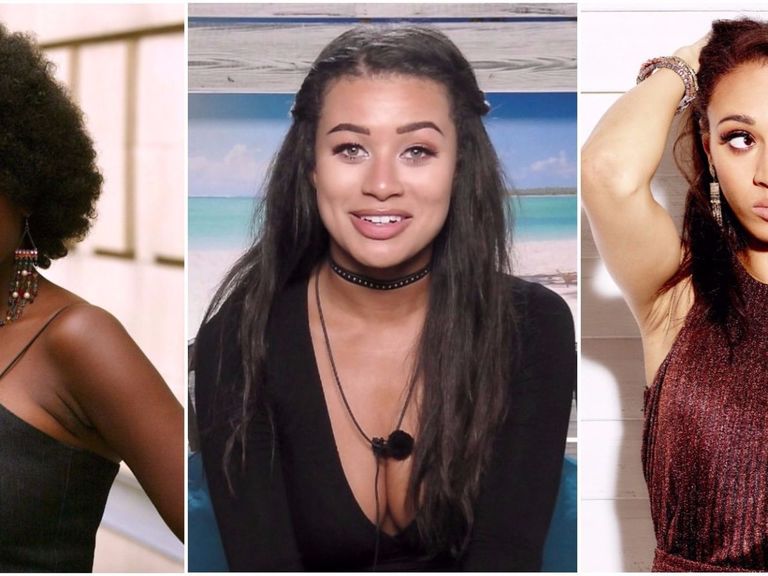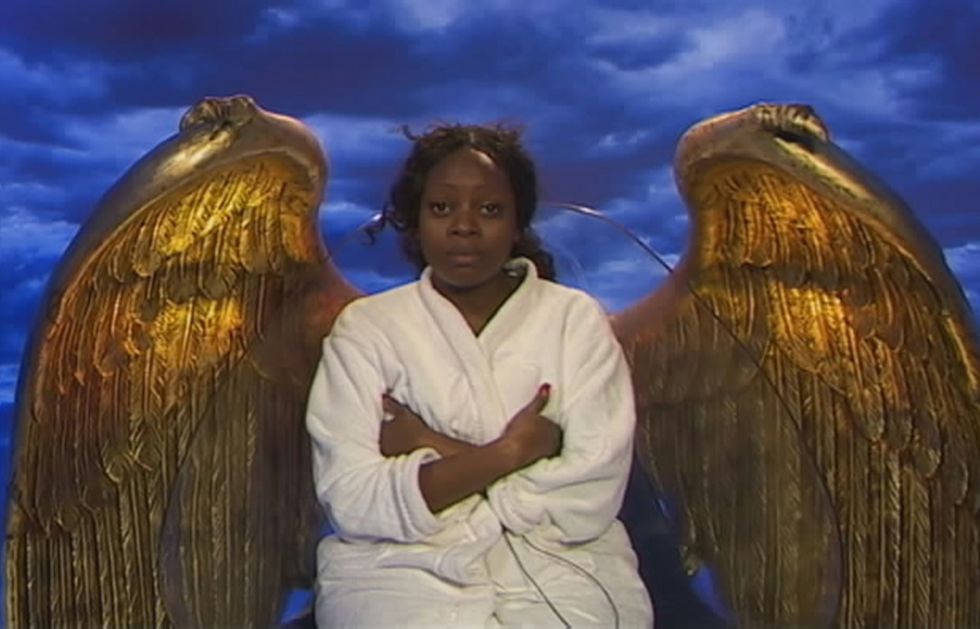To be a British reality television fan whilst black and female, is to be constantly conflicted.
On the one hand, a desire to see ourselves on screen leaves us sadly wondering if Ofcom's regulation only permits one black person per show, every other year. On the other hand, we seriously joke that white people can keep their reality TV programmes - it's the one place we don't want diversity, fearing the almost agenda-like commitment to only casting those that embody every stereotype going.
But as drama and fiction continue to get more diverse, isn't it time reality TV got real?
'Grafting' might have infected every 20-something's universe this summer, but black women don't exist in the Love Island universe. Out of the 39 female contestants who have appeared on the show, only three have been mixed race - including this year's Montana Brown and Ellisha-Jade (who made it as far as Casa Amor). Not one has been black.
Rachel Christie took part in the hit show's first series; a programme as much about popularity as it is desirability. But despite being a literal beauty queen, Christie still found herself continually struggling with recouplings on the show.
'When it comes round to the guys picking the women, you know they're not going to pick you,' sighs Christie. 'A lot of people are brainwashed into thinking [black] is not beautiful. And obviously that's a load of rubbish.'
As a mixed raced woman, Christie believes she was fair skinned enough to be cast but still too dark to find a match as her white counterparts did.
'They are more likely to put a dark skinned man in the house than they are a dark skinned woman,' she says. 'I was shocked to see a mixed race man in there when I first went in, but then that is their black. [For the producers of the show], mixed race is their black and that is enough. I was also shocked when I saw Marcel in it because he's dark skinned.'
In Big Brother, the Godfather of British trash TV, villains, underdogs and various kinds of characters are cast in the hopes entertaining the nation. But unlike white contestants who are depicted as coming from various walks of life, if we appear at all, the 'black woman' is a character. Her inclusion is to exacerbate stereotypes, whether it's hypersexuality (Makosi Musambasi, Bianca Lake), anger issues (Alexandra De-Gale, Charley Uchea) or just sheer invisibility (Pauline Bennett, Vanessa Mcintosh).
In series six, Musambasi was an iconic housemate, made famous by an equally infamous hot tub scene with the show's eventual winner Anthony Hutton. But whilst she doesn't regret her time spent there, the reputation she left the BB House with toll on the then 25-year-old nurse.
'I feel I went in there strong and came out weaker. When I left Big Brother, it's like I left my mind there. I literally left my soul in the four walls and I just came out with two big tits. Because that's how the awaiting world described me. So then in reacquainting myself with who I was, I was just met with topless picture after topless picture. I don't have one breast because I've just survived breast cancer - so I've now needed to recalibrate myself separately from what Britain defined me as; the black girl with the big boobs.'
Musambasi is eloquent about the stereotype she fulfilled whilst in the Big Brother house.
'When [the producers] came for the black girl they wanted on the show, she was going to be obnoxious, she was going to play sexy. When I came out I was quite surprised most people that wanted interviews and shoots with me were like The Star newspaper. Or people wanted topless shots. When you've been away from everything for three months, you don't have time to think about why it's happening. But when I watched the show back, it made sense that only those people were going to approach me, because that's how I had been portrayed.'
Christie also recalls her experience of being pigeonholed. After being asked to audition, she felt as though producers were disappointed with her lack of 'sass'.
'I went in there as myself and they were unhappy with it, because I wasn't the aggressive black woman they wanted me to be. I confronted them about it...I said to them you almost put this one black female in there every year and they always seem to be the aggressive, loud one and that's not how everybody is.'
Black Big Brother contestants are cast to be controversial and confrontational, and even when they aren't, they're read as much thanks to hundreds of years of stereotyping.
Before a black female contestant can be liked by the public for who she is, she must convince the public she's not the various things society says she is.
This was the case this year for Deborah Agboola, a housemate of Nigerian-descent who was bookies favourite to come second, the highest ranking for a black woman in the show's history.
Instead, she came a respectable third, subsequently becoming only the third black women to make it to the final, along with Gina Rio from series 14 and Musambasi. There has never been a black female Big Brother winner in the UK, US, Canadian or Australian versions of the show. Even Tiffany Pollard - sentient reaction GIF and hands-down the best Celebrity Big Brother housemate of all time - only managed to come fourth.
Despite Agboola's popularity this year, she still had to battle stereotypes both inside and outside of the house, being swiftly written off as aggressive by fellow housemates during a heated argument.
'If I took away my skin colour...no one would say I'm aggressive,' she retorted. Agboola simply could not afford to let the 'aggressive' label stick.
Anger is a trait thrust onto black women by both producers and the public, but unlike others, we are not rewarded for it. In a world where professional mean girl Helen Wood won a series for her notorious put-downs and frequent outbursts, black women are usually vilified for a slight raise of voice by week three.
Even outside of Big Brother - when Naomi Hedman and Megan Mckenna went head to head in series four of Ex On The Beach in a fist fight - Mckenna was rewarded with a role in Celebrity Big Brother. Whilst there, a vicious temper tantrum helped launch her now thriving career on The Only Way Is Essex (TOWIE).
Think of any reality TV show and the problem exists.
TOWIE has had a single black female cast member - Danni Park-Dempsey - in its seven year history.
She lasted just one series.
Made In Chelsea introduced their first black male character Akin Solanke-Caulker last year, but is still to recruit a black woman. It is precisely the lack of diversity that sees black Brits switching off and tuning into American reality TV, which have several widely popular, all black programmes such as the Love and Hip Hop franchise, Bad Girls Club and Basketball Wives.
These shows themselves are controversial - they, too, are known for peddling dangerous myths about black women. But there is clearly an appetite for black reality TV cast members, as a similarly divisive Youtube debate show, BKChat London, has made undeniable waves across black Britain. The series is populated with an entirely black cast and their first ever episode has amassed over 900,000 views. For comparison, TOWIE's views averaged at 100,000 less than this in 2015.
Still, Christie thinks we'd be better off with more inclusive mainstream reality TV shows instead.
'We're supposed to be a multicultural country. Isn't that what we're supposed to represent? You're meant to have diversity but they're not doing that on the TV shows. If you look at TOWIE it's all the same cast. It's like they handpick a bunch of people and they put them everywhere. They're clones in every single TV programme. It feels like to me they just throw a black person in there so people can say 'look there's one''.
Musambasi on the other hand believes it's a problem more pervasive than casting. For real diversity to take place, a structural change is needed at the top for meaningful change to filter down through the system.
'During my whole audition process, I never sat in front of a black person,' she tells me.
'For there to be diversity in reality TV, there has to be diversity in the executive team. If there was a black woman in the executive team, we would not have been portrayed that way. The problem is not the fruit, it's the root. The problem goes back to the script, the executive producers, the people doing the auditions. Big Brother was a fun experience, it completely changed the path I'm on now. I would have never left the hospital if it wasn't for the show. But everyone writing the script has to change.'














